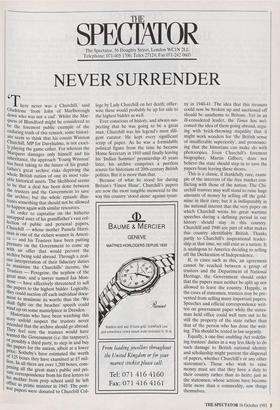SPECTAT T OR
The Spectator, 56 Doughty Street, London WC1N 2LL Telephone: 071-405 1706; Telex 27124; Fax 071-242 0603
NEVER SURRENDER
hcre never was a Churchill,' said Gladstone 'from John of Marlborough down who was not a cad'. Whilst the Mar- quess of Blandford might be considered to be the foremost public example of the enduring truth of this remark, some histori- ans seem to think that his cousin Winston Churchill, MP for Davyhulme, is not exact- ly playing the game either. For whereas the M. arquess damages only himself and his Inheritance, the approach 'Young Winston' has been taking to the future of his grand- father's great archive risks depriving the whole British nation of one its most valu- able historical assets. The likelihood seems to be that a deal has been done between the trustees and the Government to .save the archive; but the whole episode Illus- trates something that should not be allowed to happen again with similar resources. In order to capitalise on the hitherto untapped asset of his grandfather's vast col- lection of public and personal papers, Churchill — whose mother Pamela Harri- man is one of the richest women in Ameri- ca — and his Trustees have been putting pressure on the Government to come up with an offer that would prevent the archive being sold abroad. Through a zeal- ous interpretation of their fiduciary duties to maximise the Churchills' income, the Trustees — Peregrine, the nephew of the great man, and a lawyer named Ian Mon- trose — have effectively threatened to sell the papers to the highest bidder. Logically, they could auction off each individual docu- ment to maximise its worth; thus the 'We shall fight on the beaches' speech could wind up on some mantelpiece in Dresden. Historians who have been watching this story unfold suspect the trustees never Intended that the archive should go abroad. They feel sure the trustees would have wanted the Government (i.e. the taxpayer), or possibly a third party, to step in and buy the Papers for the nation, albeit at a lower price. Sotheby's have estimated the worth Of 125 boxes they have examined at £5 mil- lion. In all there are over 1,200 boxes, com- prising all the great man's public and pri- vate correspondence from his first letters to his mother from prep school until he left Office as prime minister in 1945. The post- war papers were donated to Churchill Col-
lege by Lady Churchill on her death; other- wise these would probably be up for sale to the highest bidder as well. Ever conscious of history, and always sus- pecting that he was going to be a great man, Churchill was his legend's most dili- gent curator. He kept every significant scrap of paper. As he was a formidable political figure from the time he became Home Secretary in 1910 until finally leaving his 'Indian Summer' premiership 45 years later, his archive comprises a peerless source for historians of 20th-century British politics. But it is more than that. Because of what he stood for during Britain's 'Finest Hour', Churchill's papers are now the most tangible memorial to the way this country 'stood alone' against tyran
ny in 1940-41. The idea that this treasure could now be broken up and auctioned off should be anathema to Britons. Yet in an ill-considered leader, the Times has wel- comed the idea of them going abroad, argu- ing with brick-throwing stupidity that it might work wonders for 'the British sense of insufferable superiority', and pronounc- ing that the historians can make do with photocopies. Even Churchill's foremost biographer, Martin Gilbert, does not believe the state should step in to save the papers from leaving these shores.
This is a classic, if thankfully rare, exam- ple of the interests of the free market con- flicting with those of the nation. The Chi- urchill trustees may well stand to raise huge amounts of money by selling off the gold- mine in their care; but it is indisputably in the national interest that the very paper on which Churchill wrote his great wartime speeches during a defining period in our history should stay in this country. Churchill and 1940 are part of what makes this country identifiably British. Thanks partly to Churchill's inspirational leader- ship at that time, we still exist as a nation. It is analogous to America deciding to selling off the Declaration of Independence.
If, in cases such as this, an agreement cannot be reached between a group of trustees and the Department of National Heritage, the Government should order that the papers must neither be split up nor allowed to leave the country. Happily, in the cases of statesmen, trustees may be pre- vented from selling many important papers. Speeches and official correspondence writ- ten on government paper while the states- man held office could well turn out to be. still the property of the state rather than that of the person who has done the writ- ing. This should be tested in law urgently.
Equally, a one-line enabling Act redefin- ing trustees' duties in a way less likely to do such damage to British national identity and scholarship might prevent the dispersal of papers, whether Churchill's or any other statesman's. Those who wish to raise money must see that they have a duty to their country rather than to heirs; just as the statesmen, whose actions have become little more than a commodity, saw things themselves.


























































 Previous page
Previous page